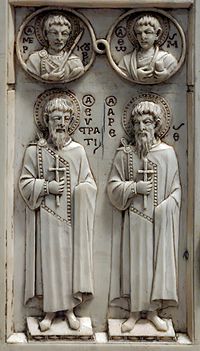
Arethas of Caesarea
Encyclopedia

Archbishop of Caesarea
The Archbishop of Caesarea was one of the major suffragans of the Latin Patriarch of Jerusalem during the Crusades. The Bishop of Caesarea became metropolitan of Palestine in the early 3rd century but after the Council of Chalcedon in 451 he was subordinate to the Patriarch of Jerusalem...
early in the 10th century, and is reckoned one of the most scholarly theologians of the Greek Orthodox Church.
Life
He was born at Patrae (modern-day GreeceGreece
Greece , officially the Hellenic Republic , and historically Hellas or the Republic of Greece in English, is a country in southeastern Europe....
). He was a disciple of Photius. The latest known date of his life is 932.
Works
He is the compiler of a Greek commentary (scholia) on the ApocalypseApocalypse
An Apocalypse is a disclosure of something hidden from the majority of mankind in an era dominated by falsehood and misconception, i.e. the veil to be lifted. The Apocalypse of John is the Book of Revelation, the last book of the New Testament...
, for which he made considerable use of the similar work of his predecessor, Andrew of Caesarea. It was first printed in 1535 as an appendix to the works of Oecumenius. Ehrhard inclines to the opinion that he wrote other scriptural commentaries. To his interest in the earliest Christian
Christian
A Christian is a person who adheres to Christianity, an Abrahamic, monotheistic religion based on the life and teachings of Jesus of Nazareth as recorded in the Canonical gospels and the letters of the New Testament...
literature, caught perhaps from the above-named Andrew, we owe the Arethas Codex, through which the texts of almost all of the ante-Nicene Greek Christian apologists have, in great measure, reached us.
He is also known as a commentator of Plato
Plato
Plato , was a Classical Greek philosopher, mathematician, student of Socrates, writer of philosophical dialogues, and founder of the Academy in Athens, the first institution of higher learning in the Western world. Along with his mentor, Socrates, and his student, Aristotle, Plato helped to lay the...
and Lucian
Lucian
Lucian of Samosata was a rhetorician and satirist who wrote in the Greek language. He is noted for his witty and scoffing nature.His ethnicity is disputed and is attributed as Assyrian according to Frye and Parpola, and Syrian according to Joseph....
; the famous manuscript of Plato (Codex Clarkianus), taken from Patmos
Patmos
Patmos is a small Greek island in the Aegean Sea. One of the northernmost islands of the Dodecanese complex, it has a population of 2,984 and an area of . The highest point is Profitis Ilias, 269 meters above sea level. The Municipality of Patmos, which includes the offshore islands of Arkoi ,...
to London
London
London is the capital city of :England and the :United Kingdom, the largest metropolitan area in the United Kingdom, and the largest urban zone in the European Union by most measures. Located on the River Thames, London has been a major settlement for two millennia, its history going back to its...
, was copied by order of Arethas. Other important Greek manuscripts, e.g. of Euclid
Euclid
Euclid , fl. 300 BC, also known as Euclid of Alexandria, was a Greek mathematician, often referred to as the "Father of Geometry". He was active in Alexandria during the reign of Ptolemy I...
, the rhetor Aristides
Aristides
Aristides , 530 BC – 468 BC was an Athenian statesman, nicknamed "the Just".- Biography :Aristides was the son of Lysimachus, and a member of a family of moderate fortune. Of his early life, it is only told that he became a follower of the statesman Cleisthenes and sided with the aristocratic party...
, and perhaps of Dio Chrysostom
Dio Chrysostom
Dio Chrysostom , Dion of Prusa or Dio Cocceianus was a Greek orator, writer, philosopher and historian of the Roman Empire in the 1st century. Eighty of his Discourses are extant, as well as a few Letters and a funny mock essay In Praise of Hair, as well as a few other fragments...
, are owing to him. Not a few of his minor writings, contained in a Moscow
Moscow
Moscow is the capital, the most populous city, and the most populous federal subject of Russia. The city is a major political, economic, cultural, scientific, religious, financial, educational, and transportation centre of Russia and the continent...
manuscript, are said still to await an editor. Krumbacher emphasizes his fondness for ancient classical Greek literature and the original sources of Christian theology
Theology
Theology is the systematic and rational study of religion and its influences and of the nature of religious truths, or the learned profession acquired by completing specialized training in religious studies, usually at a university or school of divinity or seminary.-Definition:Augustine of Hippo...
, in spite of the fact that he lived in a "dark" century, and was far away from any of the few remaining centres of erudition.

